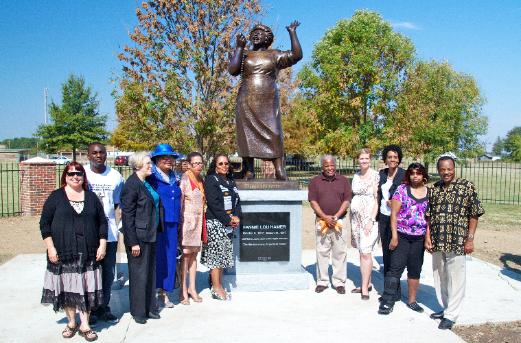
The Fannie Lou Hamer Statue Committee (FLHSC) is a not-for-profit, non political organization comprised of local, regional and national civil rights activists, scholars and community leaders who served as fundraising and educational ambassadors in conjunction with the City of Ruleville, MS, County of Sunflower, MS, public, private and individual initiatives to help achieve the goals of the Fannie Lou Hamer Statue project.
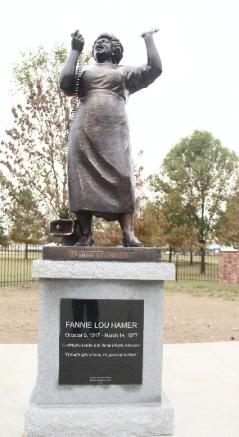
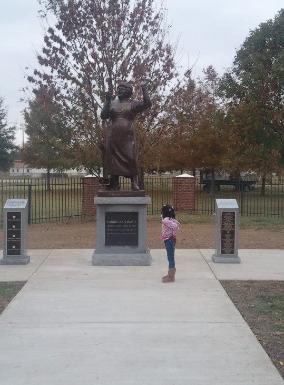
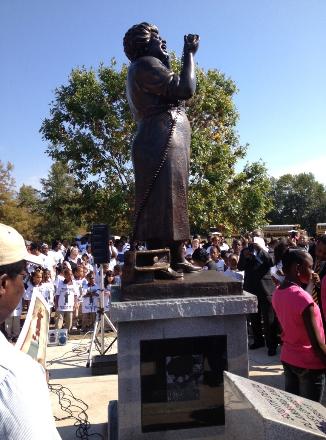
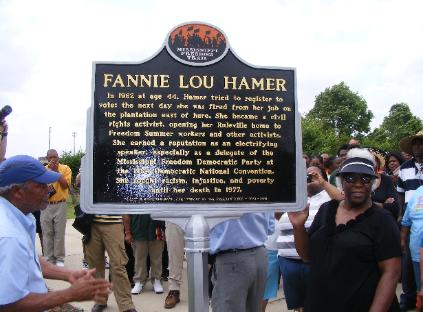
Fannie Lou Townsend was born October 6, 1917 in the Mississippi Delta on a plantation where sharecropping was the norm. She was tricked into picking cotton at the age of six in exchange for a few items from the “Boss Man’s” Store. By the time she reached age ten, Fannie was picking as much cotton as some adults. She earned the position of Timekeeper. To help calm her people down after a lynching, shooting or KKK riot, Mrs. Hamer would sing like “ain’t no tomorrow”. Fannie Lou married Perry “Pap” Hamer in 1942.
© Copyrights
Nell Draper
Winston
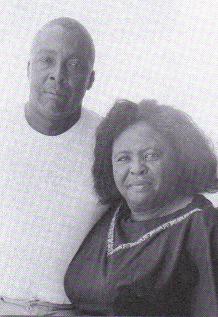
In 1962, Mrs. Hamer decided she wanted to try to register to vote after attending a SNCC voter registration meeting at William Chapel Church in Ruleville, MS pastored by the late Rev. J. D. Story. It would turn out to be just another way of asking to die.
After returning home, Mrs. Hamer was ordered to go and take her name off the registrar’s book. If she refused to do so, she would have to move. Refuse she did and move she did.
I didn’t go register for you sir, I did it for myself”, replied Fannie Lou to her boss. Mr. W. D. Marlowe. She was kicked off the plantation where she had lived for the past eighteen years.
Sixteen shots were fired into The Tuckers home over the bed Mrs. Hamer slept where she had fled for safety. “God had already told me to move on, so I wasn’t there that night,” Fannie said.
Fannie Lou Hamer, June E. Johnson, James West, Euvester Simpson, Annelle Ponder and others were jailed in Winona, Mississippi. Two black prisoners were ordered to beat Mrs. Hamer. She was beaten so badly she no longer had feelings in her legs.
Mrs. Hamer’s passion for her people and her interest and understanding of how powerful the political process was in America led her and others to create the Mississippi Freedom Democratic Party to challenge the Credential Committee in Atlantic City, New Jersey in 1964 to be seated rather than the regular Democrats who they exclaimed were “illegally elected” based on discriminatory practices against blacks statewide. “We Will Not Accept The Compromise” , stated Mrs. Hamer. She had consulted with Bob Moses and Mrs. Unita Blackwell and others prior. Mr. Lawrence Guyot (Chairman MFDP) was in jail and couldn’t make the trip.
President Johnson interrupted the nationally televised convention in order to keep Fannie Lou and her views from spreading like wildfire. All of the major networks later ran her speech in its entirety and the whole country was spellbound to hear such convictions coming from a Southerner who felt she had nothing left to fear but fear itself.
“If the Freedom Democratic Party isn’t seated today, I Question America “, Fannie told the Credentials Committee. “Is this America where we have to sleep with our phones off the hooks because we be threatened daily just cause we want to register to vote to become first class citizens”.
Mrs. Hamer’s efforts did not stop there. She challenged Black Educators to “teach our children more about our history since school books left it out”. She started a daycare center with the assistance of the National Council of Negro Women (NCNW) under the leadership of Dr. Dorothy Irene Height (President). Mrs. Hamer also, organized approximately, 640 acres of Freedom Farm land.
June E. Johnson gets very emotional when speaking about Mrs. Hamer. “I gave BLOOD with this lady, do you understand me?” I love Mrs. Hamer and she discussed with me her “Unfinished Business” while she lay on her death bed, continues Johnson. June was beaten in jail with Fannie Lou for voter registration activities as a teenager.
Fannie Lou Hamer’s labor ceased at 5:15 p.m. on March 14, 1977 in Mound Bayou, Mississippi due to Breast Cancer and complications from her jail house beating.
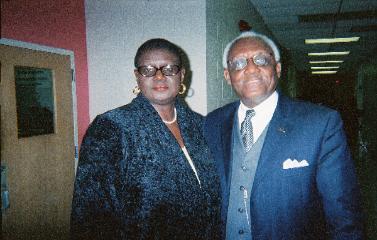
Fannie Lou Hamer worked with and sought assistance from Student Non Violent Coordinating Committee (SNCC), Southern Christian Leadership Conference (SCLC), National Council of Negro Women (NCNW), National Association of Colored People (NAACP), The Delta Ministry and numerous others. She was co- founder of the Mississippi Freedom Democratic Party (MFDP). It was the Delta Ministry under the leadership of Mr. Owen H. Brooks along with Mr. Charles McLaurin and June E. Johnson that assured Mrs. Hamer a proper burial.
Mrs. Hamer was the recipient of many awards and honors. She received an Honorary Degree of Doctor of Humanities from Tougaloo College and ShawUniversity. She, also, received honorary degrees from Columbia College and Howard University. Fannie was honored with the National Sojourner Truth Meritorious Service Award, The Paul Robeson Award from Alpha Kappa AlphaSorority and The Mary Terrell Award from Delta Sigma Theta, Inc. Delta Sigma Theta made Mrs. Hamer an Honorary member of their sorority.
Fannie Lou was inducted into the National Women Hall of Fame. On February 18,1995, The United States Post Office in Ruleville, Mississipp i was named in Fannie Lou Hamer’s honor thanks to Congressman Bennie Thompson.
There is a Fannie Lou Hamer Day Care Center in Ruleville, Mississippi that Mrs. Hamer started, a Fannie Lou Hamer Library located in Jackson, MS, a Fannie Lou Hamer Freedom High School in Bronx, New York, The Fannie Lou Hamer Political Institute founded by Dr. Leslie McLemore at Jackson State University in Jackson, Mississippi and The Fannie Lou Hamer “Women of Faith” Learning & Cultural Center. Mrs. Hamer’s speech from the 1964 Democratic Convention is inscribed on column 10 in the Civil Rights Garden in Atlantic City, New Jersey. Several people do dramatic shows re-enacting “The Life & Times of Fannie Lou Hamer” and many books and documentaries are written and produced on her.
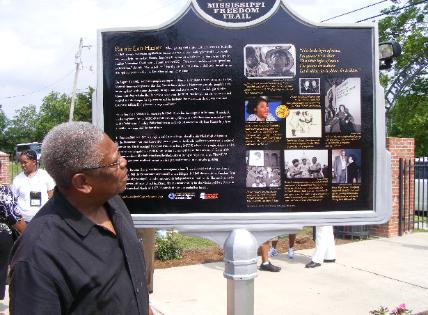

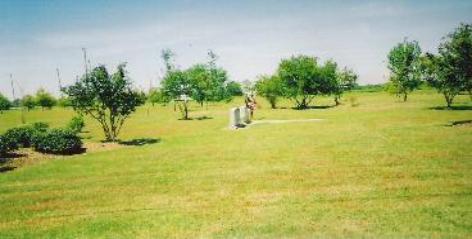
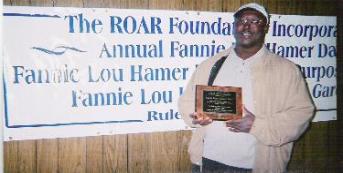
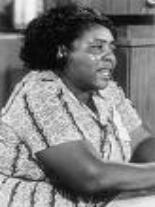
Mr. Chairman, and the Credentials Committee, my name is Mrs. Fannie Lou Hamer, and I live at 626 East Lafayette Street, Ruleville, Mississippi, Sunflower County, the home of Senator James O. Eastland, and Senator Stennis.
It was the 31st of August in 1962 that 18 of us traveled 26 miles to the country courthouse in Indianola to try to register to try to become first-class citizens.
We was met in Indianola by Mississippi men, Highway Patrolmen and they only allowed two of us in to take the literacy test at the time. After we had taken this test and started back to Ruleville, we was held up by the City Police and the State Highway Patrolmen and carried back to Indianola where the bus driver was charged that day with driving a bus the wrong color.
After we paid the fine among us, we continued on to Ruleville, and Reverend Jeff Sunny carried me four miles in the rural area where I had worked as a timekeeper and sharecropper for 18 years. I was met there by my children, who told me that the plantation owner was angry because I had gone down to try to register.
After they told me, my husband came, and said that the plantation owner was raising cain because I had tired to register, and before he quit talking the plantation owner came, and said, “Fannie Lou, do you know–did Pap tell you what I said?”
And I said, “yes, sir.”
He said, “I mean that,” he said, “If you don’t go down and withdraw your registration, you will have to leave,” said, “Then if you go down and withdraw,” he said, “You will– you might have to go because we are not ready for that in Mississippi.”
And I addressed him and told him and said, “I didn’t try to register for you. I tried to register for myself.”
I had to leave that same night.
On the 10th of September 1962, 16 bullets was fired into the home of Mr. and Mrs. Robert Tucker for me. That same night two girls were shot in Ruleville, Mississippi. Also Mr. Joe McDonald’s house was shot in.
And in June the 9th, 1963, I had attended a voter registration workshop, was returning back to Mississippi. Ten of us was traveling by the Continental Trailway bus. When we got to Winona, Mississippi, which is in Montgomery County, four of the people got off to use the washroom, and two of the people— to use the restaurant — two of the people wanted to use the washroom.
The four people that had gone in to use the restaurant was ordered out. During this time I was on the bus. But when I looked through the window and saw they had rushed out I got off of the bus to see what had happened, and one of the ladies said, “It was a State Highway Patrolman and a Chief of Police ordered us out.”
I got back on the bus and one of the persons had used the washroom got back on the bus, too.
As soon as I was seated on the bus, I saw when they began to get the four people in a highway patrolman’s car, I stepped off of the bus to see what was happening and somebody screamed from the car that the four workers was in and said, “Get that one there,” and when I went to get in the car, when the man told me I was under arrest, he kicked me.
I was carried to the county jail, and put in the booking room. They left some of the people in the booking room and began to place us in cells. I was placed in a cell with a young woman called Miss Ivesta Simpson. After I was placed in the cell I began to hear the sound of kicks and horrible screams, and I could hear somebody say, “Can you say, yes, sir, nigger? Can you say yes, sir?”
And they would say other horrible names.
She would say, “Yes, I can say yes, sir.”
“So say it.”
She says, “I don’t know you well enough.”
They beat her, I don’t know how long, and after a while she began to pray, and asked God to have mercy on those people.
And it wasn’t too long before three white men came to my cell. One of these men was a State Highway Patrolman and he asked me where I was from, and I told him Ruleville, he said, “We are going to check this.”
And they left my cell and it wasn’t too long before they came back. He said, “You are from Ruleville all right,” and he used a curse work, and he said, “We are going to make you wish you was dead.”
I was carried out of that cell into another cell where they had two Negro prisoners. The State Highway Patrolmen ordered the first Negro to take the blackjack.
The first Negro prisoner ordered me, by orders from the State Highway Patrolman for me, to lay down on a bunk bed on my face, and I laid on my face.
The first Negro began to beat, and I was beat by the first Negro until he was exhausted, and I was holding my hands behind me at that time on my left side because I suffered from polio when I was six years old.
After the first Negro had beat until he was exhausted the State Highway Patrolman ordered the second Negro to take the blackjack.
The second Negro began to beat and I began to work my feet, and the State Highway Patrolman ordered the first Negro who had beat me to sit upon my feet to keep me from working my feet. I began to scream and one white man got up and began to beat me my head and told me to hush.
One white man—since my dress had worked up high, walked over and pulled my dress down and he pulled my dress back, back up.
I was in jail when Medgar Evers was murdered.
All of this is on account of us wanting to register, to become first-class citizens, and if the freedom Democratic Party is not seated now, I question America, is this America, the land of the free and the home of the brave where we have to sleep with our telephones off of the hooks because our lives be threatened daily because we want to live as decent human beings, in America?
Thank you.
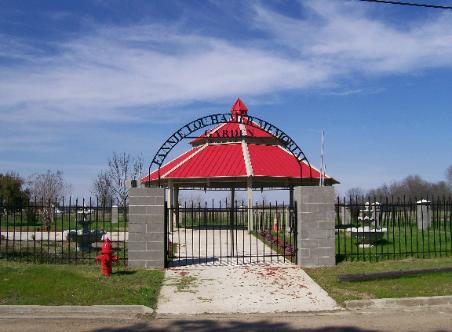
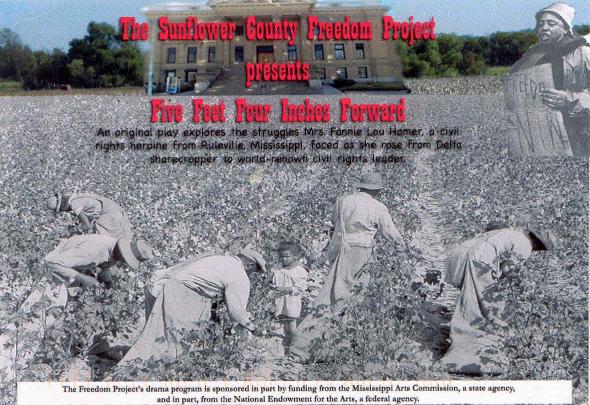
Disclaimer: information on this web site is for educational / informational and networking purposes only! Use of any copyrighted materials must be approved by its perspective owner. ROAR claims no responsibility for misuse of information obtained from this web site.
| © copyrighted ROAR | April 2004 |
| Lasted Updated | October 2012 |